抽象与具体的翻译
翻译技巧4 措词、具体化、词类转换
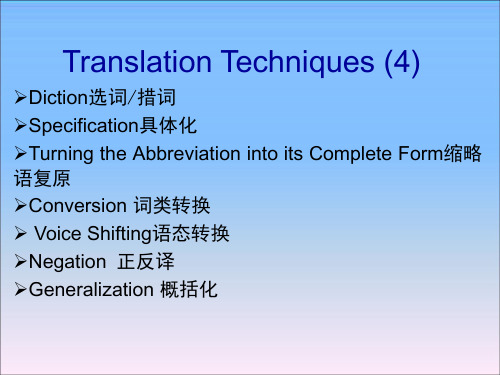
• 在西南地区广西、贵州、湖南、四川等省份,“吊脚楼”是 山乡少数民族如苗、侗、壮、布依、土家族等的传统民居样 式。尤其在黔东南,苗族、侗族的吊脚楼极为常见。这里的 自然条件号称“天无三日情,地无三里平”,于是山区先民 创造出了独特的“吊脚楼”。 • 吊脚楼依山而建,用当地盛产的杉木,搭建成两层楼的木构 架,柱子因坡就势长短不一地架立在坡上。房屋的下层不设 隔墙,里面作为猪、牛的畜棚或者堆放农具和杂物;上层住 人,分客堂和卧室,四周向外伸出挑廊,可供主人在廊里做 活和休息。廊柱大多不是落地的(便于廊下面的通行无碍), 起支撑作用的主要是楼板层挑出的若干横梁,廊柱辅助支撑, 使挑廊稳固地悬吊在半空,这种住宅因其外形和结构特点被 称为“吊脚楼”。吊脚楼的优点明显,人住楼上通风防潮, 又可防止野兽和毒蛇的侵害,这种住宅在西南山区至今仍有 建造。
• When a common word is turned into a proper noun, the meaning is narrowed accordingly such as the City, which means the “business centre of London”, the Peninsula, which refers to the “Iberian Peninsula”, and the Prophet, which stands for “Mohammed”.
英语抽象词及其翻译
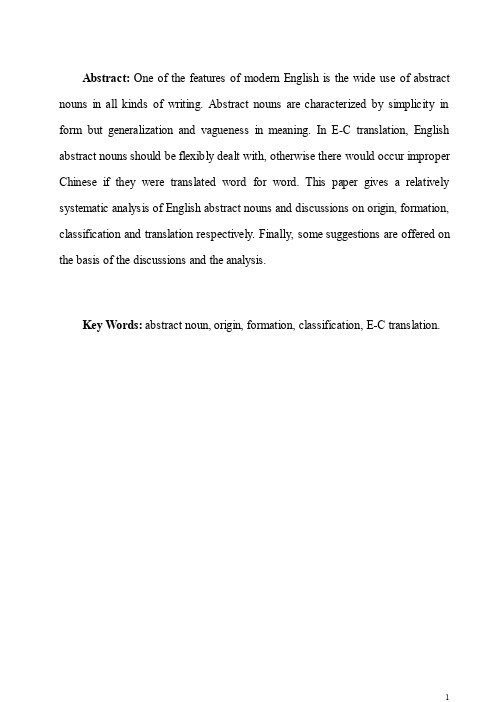
Abstract: One of the features of modern English is the wide use of abstract nouns in all kinds of writing. Abstract nouns are characterized by simplicity in form but generalization and vagueness in meaning. In E-C translation, English abstract nouns should be flexibly dealt with, otherwise there would occur improper Chinese if they were translated word for word. This paper gives a relatively systematic analysis of English abstract nouns and discussions on origin, formation, classification and translation respectively. Finally, some suggestions are offered on the basis of the discussions and the analysis.Key Words: abstract noun, origin, formation, classification, E-C translation.English Abstract Nouns and Their Translation英语抽象词及其翻译1. IntroductionNowadays, abstract nouns are frequently found in modern English. But it is not always easy to catch them and let alone to translate them. So, for English majors, it is under the necessity of making a research on them. To begin with, we need to mak e clear what abstract nouns are. “Ab stract” means “existing in thought or as an idea but not having a physical or practical existence”. (A .S.Hornby, 2000) The abstract nouns refer to an abstract quality or state, e.g., goodness or freedom. The mode of thinking, the feature of thinking and the style of thinking are language philosophical mechanism. Therefore, not only should we wipe off the barrier of languages but also we should constitute a new way of thinking in language research and translation.2. Origin of English Abstract NounsAs a matter of fact, every nation has its abstract or concrete thinking. Due to the historical reasons and cultural differences, various nations have their own unique concerns and selections. It is known to us that English people emphasize abstract thinking while the Chinese focus on concrete thinking. But what’s the real cause of this common phenomenon? The Chinese tend to think and observe things from specific perspectives. It is not habitual for them to do research and work out the relationship among different things, that is, to build abstract regulations. They pay much attention to concrete things so as to complement the abstract meanings with vivid words and express their emotions. Y et English people praise highly on deep thinking.(刘宓庆, 1996)In the process of analyzing the objective world, they take classification as their basic method and get through the surface to understand the deeper meaning. Finally, the pure abstract thinking personality has been formed. (甲小龙,1996,12)The Chinese strive perseveringly for perceptive cognition to convey profound and reasonable thought and to show connotation through skillful perception of analogy. This can be found in the vivid image by the features of pictograph, associative compounds, and pictophonetic characters. As Rudolf Flesh said, “so naturally, instead of using words like institutionalizing or anti-progressivism, as our thinkers do, they (the Chinese) formed the habits of expressing ideas by metaphors, similes and allegories, in short, by every known device for making a thing plain by comparing it with something else”.(R.Flesh, 1949)The western people lay stress on thinking which leads to the losing of the vividness in word formation and finally their words become the conceptual signs. The minimal meaning unit of the word is morphemes, which are also a linguistic abstraction and a concept. It is obvious that the use of abstract nouns in English is more frequent than that in Chinese. We can find the action abstract nouns, which contain the behavior meaning and action meaning. For example,a) I marveled at the relentless determination of the rain.b) He had surfaced with less visibility in the policy decision.Abstract nouns can also be found to express people, object or phenomenon. Le t’s look the example,e.g. Wisdom prepares for the worst, but folly leaves the worst for the day it comes.Abstract nouns are also used to convey the complicated reasoning concept.e.g. The absence of intelligence is an indication of satisfactory developmentFrom the above examples, we can find that more abstract nouns are used in English than in Chinese. So the proper use of abstract nouns will make translation more idiomatic.3. Formation of Abstract NounsThere are mainly two ways to form abstract nouns. One is to form a noun from a verb or an adjective. The other is to form a noun from a verbal phrase or a prepositional phrase.3.1Abstract Nouns Composed by Adding SuffixesAbstract nouns can be formed by adding suffixes, as:-ness, -tion, -ity, -ure, -ence, -ment, -ship and so on behind verbs or adjectives. The words such as approval, management and popularity are all formed this way.1) V erb+-ment, -al, -sion, -tion and -ageV+ment: argument, development, settlement.V+al: arrival, approval, betrayal.V+sion or tion: conclusion, diversion, expression, confusion.V+age: flowage, leakage, passage, shortage, stoppage.V+y: mastery, discovery, unity, entreaty, envy.2) Adjective +-ness, -dom, -hood, -ity, or –ty.Adj+ness: darkness, loneliness, effectiveness, hardness, goodness, illness.Adj+dom: wisdom, freedom, officialdom.Adj+hood: falsehood, likelihood, livelihood.Adj+ity or -ty: safety, ability, necessity, loyalty, acidity, activity, density.3) Adj or V erb+-th or -t, -ry, -cy, -ance(ancy) or –ency(ence)Adj or V +th or t: death, thought, growth, strength, truth,width.Adj or V +ry: bravery, distillery, finery, watery, inquiry, discovery.Adj or V +cy: accuracy, advocacy, intimacy, bankruptcy, secrecy.Adj or V +-ance(ancy) or –ence(ency): tolerance, absence, appearance, consistence, decency, reliance, continence, disturbance, reference, allowance, assistance.3.2Derivative Abstract NounsDerivative abstract nouns are those words derived from verbal phrases or prepositionsl phrases. The function of the two kinds of nouns is to give an abstract description that is similar to that of other abstract nouns. Also such derivative nouns contain meanings of abstraction or exaggeration. So they are called abstract nouns.a) His business takes a turn for the better. (improvement of something that already existsor that has gone before)b) Although it was well on in the evening, we decided to try our luck at fishing again. (tryto do or get something, hoping to succeed)4. Classification of Abstract NounsSimilarly, there are countable abstract nouns and uncountable ones. But in modern English, most of abstract nouns are uncountable ones, with some countable, and some both countable and uncountable.4.1 Countable Abstract NounsCountable abstract nouns not only have plural forms but also can be used with indefinite articles.a) It’s quite a task to figure out ten problems in an hour.b) There are a lot of heavy tasks for the young people to take upon themselves.a) Mr.Collinton had a narrow victory in the reform.b) We have to consolidate our victories in the reforms.a) Would you spare me a few minutes? I want to have a talk with you.b) The students enjoyed his talks on American cultureSometimes countable abstract nouns can be used as uncountable ones, but with their meanings changed.a) He’s all talk. (It means that he only talks but never takes action.)b) I took him to talk for his carelessness. (It means that I blamed him for his carelessness.)4.2Uncountable Abstract NounsThere are so many uncountable abstract nouns that here are only a few can be discussed.a) We’re sure of his honesty.b) She used to take some work home to do when she was a worker.c) His happiness defies utterance.d) She has made great progress in her studies.e) The Long March was of great historical significance.4.3 Meanings of Abstract NounsSome abstract nouns can be used either as countable nouns or uncountable ones, but with meanings changed. Here are some examples.a) He’s a professor of ten years’ experience. (knowledge or skill gained from doing something)b) Her tour by spaceship was quite an experience. (event or activity affecting one in some way)a) I’m always grateful to her kindness in helping me to tide over the difficulties. (good intention)b) They have done him a few personal kindnesses. (good deeds)a) Friendship first, competition second. (close relationship)b) His friendships never last very long. (behaviors that embody good relationship)a) Nowadays passengers have to be searched for security reasons. (Safety)b) Recently people like to trade in government securities. (bonds)Generally speaking, abstract nouns derived from countable single nouns usually have changed meanings. For example,a) There are three rooms in his flat. (shelters)b) There’s much room for discussion. (leeway)a) It is known that he is a fool. (stupid person)b) She was fool enough to believe him. (stupid person)a) They will live forever in our hearts. (minds)b) No matter what difficulties may come our way, we must never lose heart. (confidence)Broadly speaking, abstract nouns derived from verbs or adjectives usually keep their basic meanings. The examples are shown below.a) He held a position of importance when he was alive.b) It is important to have a good mastery of foreign language.a) Though he is only five, he is able to swim.b) We have confidence in their ability to resolve the problems.a) He approved himself an honest man.b) Don’t slightly express your approval or disapproval.a) This well delivers one thousand tons of oil a day.b) Y ou’re required to make delivery of the goods before June.From the above discussion, we can easily find that not every abstract noun is uncountable and it is better to consult the dictionaries when unfamiliar abstract nouns are met. Never take it for granted that abstract nouns always keep their meanings unchanged.5. Translation of Abstract NounsLanguages are a tool of expressing and communicating. Although different languages have much in common in expression ways and word usages, the existence of differences is very normal. There is no exception between English and Chinese. Mostly it depends on the translator whether the differences can be reduced to the minimum or not. Here is an old English saying: “Words have no meanings; people have meanings for the words.”(王敬群,2001)English word have connotations which are so broad that we must follow contexts to get their exact meanings especially for English abstract nouns. Some of them have their equivalent words in Chinese, such as “science”, “literature”, “friendship”, “phenomenon”, “art”, and so on. But most of them have no equivalents. In English reading materials, we often meet abstract nouns, of which we can only understand their meanings, but can’t say clearly the ir exact meanings in simple words in the target languages. So we often have trouble in understanding their abstract and conceptive meanings, which is usually the obstacle for translators. In order to express their meanings precisely and make them easier for the readers to understand, we should make painstaking efforts to research into abstract nouns to know their nature and characteristics so as to translate them correctly. Compared with English, Chinese is more concrete and plain. Therefore it is a better way to translate them into concrete and vivid Chinese words. The following are common ways for translation.5.1 Translating Abstract Nouns into Adjectives1) Abstract nouns derived from adjectives can often be translated into adjectives. This is an effective method to deal with the problem.a) The photo mask must possess dimensional stability.光掩模必须具有稳定的(stable)尺寸。
[重点]论英汉翻译中的视角转换
![[重点]论英汉翻译中的视角转换](https://img.taocdn.com/s3/m/8974f67c793e0912a21614791711cc7931b77824.png)
论英汉翻译中的视角转换1.引言语言是文化的载体,体现人类的思维活动。
不同的文化对语言风格和表达方式产生了极大的影响,使得语言中的视角存在一定的差异,因此在翻译时,译者要挣脱原语文化的传统思维模式,使原语所传达的信息,所体现的风格一并能被读者完全体会。
这就要求译者在了解语言文化背景及视角差异的基础上,在翻译过程中进行视角转换。
2.文献回顾在研究翻译的视角转换这个领域已有不少学者涉及,研究成果也颇丰富。
如刘保华在“英汉翻译技巧:视角转换”中介绍了主要的视角转换法;邵卫平在他的“英汉视角对比及翻译中的视角转换”也对如何进行视角转换进行了相关阐述;张小珊在“中英文翻译视角转换浅议”中提出了自己的观点。
当然还有很多专家学者对这一论题进行了探讨,在这暂不一一列举。
本文准备从英汉翻译视角转换的重要性和视角转换的方法入手,就这个论题谈谈我的观点。
3.英汉翻译中的视角转换翻译在很大程度上不仅是语言的交流,更是文化之间的交流。
由于英、汉语在产生的背景、经历的历史上有很大的不同,许多文化的观察视角也就有了很大区别。
请看如下一例: What we lose in hake we shall have in herring. (失之东隅,收之桑榆。
) 在此例中原句用了hake(鳕鱼)和herring(鲱鱼)两种鱼来表示,因为历史上西方人以航海捕鱼闻名,各种鱼类对他们而言是非常必需的,从中就可以看出西方人的生活习惯。
但如果直译成“我们从鳕鱼中失去的将会从鲱鱼中得到”,中国读者就不明其意了。
如果换成中国人熟悉的“东隅”“桑榆”两个词,就能达到意义上的对等,中国读者便能很清楚地了解这句话所传达的意思。
3.1翻译中视角转换的必要性译者在翻译过程中自始至终都在考虑如何将原语传递到译语中,而在信息传递的过程中,转换是必不可少的。
刘宓庆先生说:“转换是翻译中用得最广泛的变通手段。
在一般情况下,转换是获得灵活对应的不可少的应变对策,而失去形式则常常是转换带来的必然结果。
词法翻译(四)具体译法
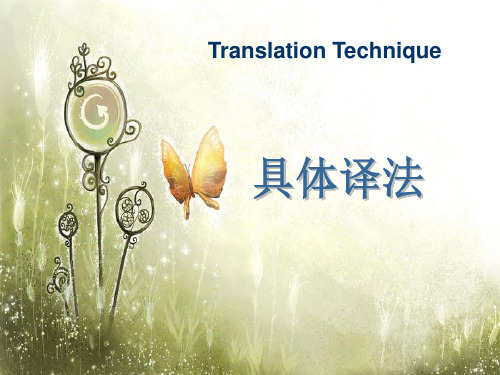
你应该分清好坏。 separate the good from the bad You should separate the sheep from the goats.
分清大小: separate the big from the small 分清主次: draw a clear distinction between the primary and the secondarythorny problem; knotty problem; a problem of some delicacy; He has many hot potatoes to handle every day.
你不要过早乐观,真正的困难还在 后头呢。
full of anxiety and worry
(三)句子(英译汉)
All the people were angered by his fault-finding.
所有的人都被他的吹毛求疵的做法激 怒了。
We were all greatly moved by his loftiness.
我们都被他那种崇高气质所深深打 动。
translation
family committee government
翻译
家庭 委员会 政府
翻译作品
家庭成员 委员会成员 政府官员
class
班级
全班同学
(二)成语
单词 very timid very strong very anxious to return home 抽象 非常胆小 十分强壮 非常想回家 十分挂念 具体 胆小如鼠 壮得像头牛 归心似箭 牵肠挂肚
prematurely optimistic Don’t count your chickens before they are hatched.
英汉翻译中的虚实互化
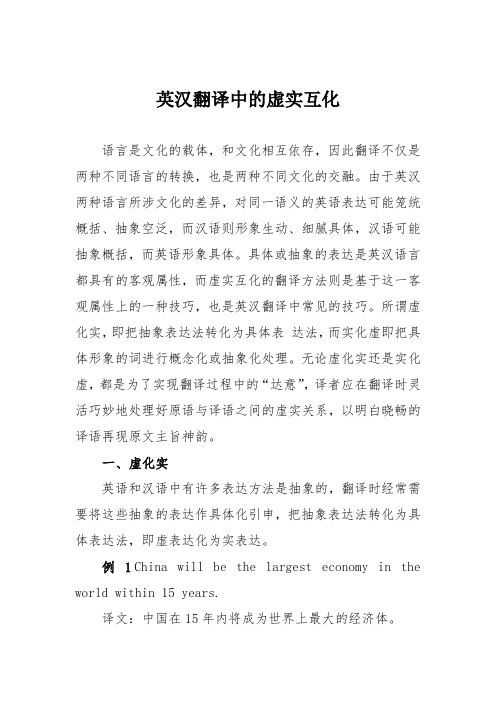
英汉翻译中的虚实互化语言是文化的载体,和文化相互依存,因此翻译不仅是两种不同语言的转换,也是两种不同文化的交融。
由于英汉两种语言所涉文化的差异,对同一语义的英语表达可能笼统概括、抽象空泛,而汉语则形象生动、细腻具体,汉语可能抽象概括,而英语形象具体。
具体或抽象的表达是英汉语言都具有的客观属性,而虚实互化的翻译方法则是基于这一客观属性上的一种技巧,也是英汉翻译中常见的技巧。
所谓虚化实,即把抽象表达法转化为具体表达法,而实化虚即把具体形象的词进行概念化或抽象化处理。
无论虚化实还是实化虚,都是为了实现翻译过程中的“达意”,译者应在翻译时灵活巧妙地处理好原语与译语之间的虚实关系,以明白晓畅的译语再现原文主旨神韵。
一、虚化实英语和汉语中有许多表达方法是抽象的,翻译时经常需要将这些抽象的表达作具体化引申,把抽象表达法转化为具体表达法,即虚表达化为实表达。
例1China will be the largest economy in the world within 15 years.译文:中国在15年内将成为世界上最大的经济体。
economy直译成中文为“经济”,汉语中“经济”表示抽象概念,如果该句直译成“中国在15年内将成为世界上最大的经济”,显然不符合汉语的表达习惯。
译文把表示抽象概念的词“经济”具体化为“经济体”,不仅意思明确,也完全符合汉语表达习惯。
例2Rich woking experience was his entrée to this large international company.译文:丰富的工作经验是他进入这家大型跨国公司的敲门砖。
entrée是抽象名词,本意是“入场权;入场许可”,此处将该词义具体引申为“敲门砖”,使表达更加形象具体。
例 3There is more to their life than political and social and economic problems; more than transient everydayness.译文:他们的生活远不止那些政治的、社会的和经济的问题,远不止一时的柴米油盐问题。
抽象化与具体化
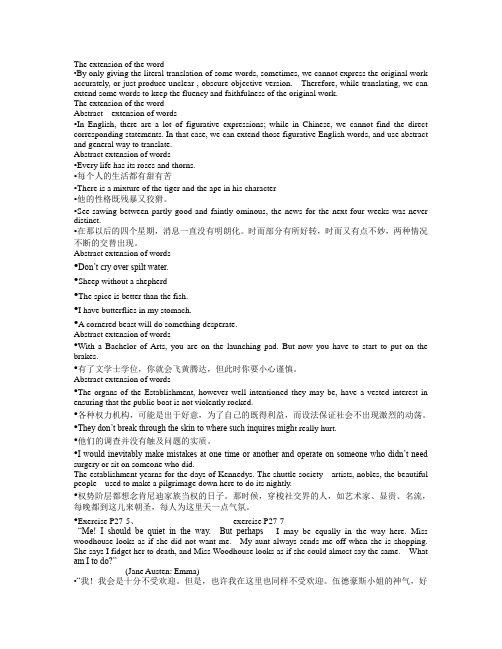
The extension of the word•By only giving the literal translation of some words, sometimes, we cannot express the original work accurately, or just produce unclear , obscure objective version. Therefore, while translating, we can extend some words to keep the fluency and faithfulness of the original work.The extension of the wordAbstract extension of words•In English, there are a lot of figurative expressions; while in Chinese, we cannot find the direct corresponding statements. In that case, we can extend those figurative English words, and use abstract and general way to translate.Abstract extension of words•Every life has its roses and thorns.•每个人的生活都有甜有苦•There is a mixture of the tiger and the ape in his character•他的性格既残暴又狡猾。
•See-sawing between partly good and faintly ominous, the news for the next four weeks was never distinct.•在那以后的四个星期,消息一直没有明朗化。
chapter 7 英汉翻译中的词义引申
the news for the next four weeks was never distinct.
在接下来的四个星期里,消息时好时坏,两种 情况不断交替出现,一直没有明朗化。 (see-saw 在英文中本来是“玩跷跷板”之意, 但在这里如果直译,则译文就会不知所云,无 法同后面内容联系起来。因此,这里我们应该 透过原文的现象去抓住原文的精神实质。将 see-sawing 翻译成“不断交替出现”正是抓 住了精神实质。)
3. 由于这部影片造成了排山倒海的影响,它提供了最好 的契机来开始化解种族矛盾,经过相当长的时间使创伤 得以愈合。 (avalanche 的本义为a large mass of snow and ice crashing down the side of a mountain (Longman Dictionary of Contemporary English) avalanche即“雪崩”。该词语的本义是具体的,但在 本例原文中是用于比喻意义。因此在翻译时,我们要透 过现象看本质。在这里,将该词翻译成汉语的“排山倒 海的影响”正是抓住了所描述事件的本质。)
tiger n. 虎 凶汉,暴徒;凶残成性的人 (穿制服的)马夫 [英口](网球比赛的)劲敌 [美](欢呼三声后)加喊的欢呼; 喝采尾声 虎的图象(以虎为标志的组织) 触发器 work like a tiger 生龙活虎地工作 tiger cat 【动】豹猫 three cheers and a tiger 三声欢呼一声吼 How can you catch tiger cubs without entering the tiger's lair? 不入虎穴, 焉得虎子?
英语抽象名词的翻译
矿产资源开发利用方案编写内容要求及审查大纲
矿产资源开发利用方案编写内容要求及《矿产资源开发利用方案》审查大纲一、概述
㈠矿区位置、隶属关系和企业性质。
如为改扩建矿山, 应说明矿山现状、
特点及存在的主要问题。
㈡编制依据
(1简述项目前期工作进展情况及与有关方面对项目的意向性协议情况。
(2 列出开发利用方案编制所依据的主要基础性资料的名称。
如经储量管理部门认定的矿区地质勘探报告、选矿试验报告、加工利用试验报告、工程地质初评资料、矿区水文资料和供水资料等。
对改、扩建矿山应有生产实际资料, 如矿山总平面现状图、矿床开拓系统图、采场现状图和主要采选设备清单等。
二、矿产品需求现状和预测
㈠该矿产在国内需求情况和市场供应情况
1、矿产品现状及加工利用趋向。
2、国内近、远期的需求量及主要销向预测。
㈡产品价格分析
1、国内矿产品价格现状。
2、矿产品价格稳定性及变化趋势。
三、矿产资源概况
㈠矿区总体概况
1、矿区总体规划情况。
2、矿区矿产资源概况。
3、该设计与矿区总体开发的关系。
㈡该设计项目的资源概况
1、矿床地质及构造特征。
2、矿床开采技术条件及水文地质条件。
抽象名词具体化-passage 3
3.抽象名词具体化(1)The delight of the children at the sight of some dish on the table showedthat it was a rarity.一看到桌上的某道菜孩子们就笑逐颜开/兴高采烈/喜笑颜开/眉开眼笑,可见这是他们平时难得吃到的东西。
(2)The hotel is a massive effort of stone,wood and concrete.这家旅馆是用石头、木料和混凝土建成的巨大建筑物。
(3)She is a valuable acquisition to the firm.她是这家公司不可多得的人才。
(4)Colour schemes, and interior decoration were modern, but still Chinese,and much more beautiful than the attempts I had seen in 1982 to produce a"Western-type" bar or disco or restauraht in some hotels.色彩的配置,内部的装饰都是现代化的,然而仍具有中国特色,比1982年我看到的有些饭店模仿西方建起来的酒吧、迪斯科舞厅和餐厅可漂亮多了。
(5)Perhaps it was the emotion welling up from the huge welcoming throng,perhaps it was the memories of his youth, but when he spoke to the crowdabout his parents, he was near tears and his voice cracked.或许是看到欢迎他的拥挤人群而感情冲动,或许是由于想起了他年前时的一些事情,他在大庭广众前谈到他双亲时,竟几乎哭了出来,声音也哽塞了。
文学翻译抽象的具体化转换研究
文学翻译抽象的具体化转换研究作者:于无声全红张凤来源:《文学教育·中旬版》2013年第06期[摘要] 抽象表达的使用非常普遍。
抽象的具体化转换是文学翻译中难点与重点。
保证抽象的具体化转换能够保证翻译的准确性。
抽象的具体化转换具有主要有三个方面。
一是直译,二是改换词语的比喻形象,三是把抽象的词义引申为具体的词义。
[关键词] 文学翻译;抽象;具体化转换一、导言在英语教学中,翻译是一个很重要的教学内容。
它不仅是英语语法、词汇的综合检验,而且能反映出翻译者文学翻译水平以及翻译语言表达技巧。
在文学翻译中,的抽象与具体转换是重要内容。
用一个表示具体形象的词来表示一种抽象的概念,如品质、特性、情感或状态等,或者用一个代表抽象概念或属性的词来表示一种具体的事物,这是英语中常用的修辞手段。
例如,Have you read any humor recently?(译):近来你读了什么幽默作品吗?(分析):原文中的humor 本意是“幽默”,是一个代表抽象概念的词,但在这里表示具体的事物“幽默的文章”,因此根据上下文可译为“幽默作品”。
然而,由于文化和语言文化的差异,英语中无论是表示抽象概念意义的具体词语还是表示具体事物的抽象词语,在很多情况下都不能“对号入座”直译成汉语,否则,译文要么词不达意,要么不符合汉语的习惯。
因此,抽象的具体化转换是文学翻译中的难点与重点。
二、抽象表达的原因抽象表达法在英语里使用得相当普遍,尤其常用于社会科学论著、官方文章、报刊评论、法律文书、商业信件等文体。
这种表达法得以流行,还有以下几个主要原因。
一是抽象思维被认为是一种高级思维,是文明人的一种象征。
随着科学技术的发达和文明社会的进步,原有的感性表达方式已不足以表达复杂的理性概念,因而需要借助于抽象概括的方法。
此外,许多作者为了显示其思想深奥而故弄玄虚,追随时尚,也嗜好抽象表达法。
二是抽象词语意义模糊,便于掩饰作者含混或真实的思想,以迎合其某种表达的需要,因而也得以流行。
